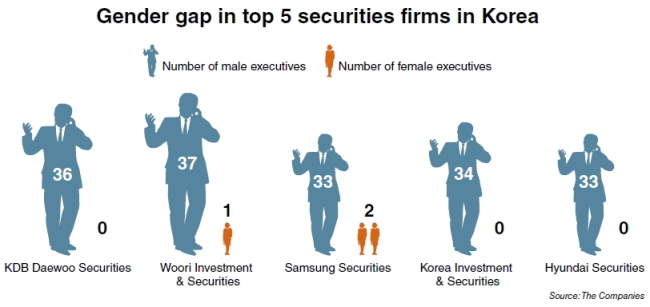Lee Ha-eun, 22, who majors in business administration at Korea University, is reconsidering her career goal to become a securities analyst in Korea after getting career counseling from her alumni working in the financial sector.
“I was disappointed, as all of my seniors, male and female, advised me to reconsider starting my career at a securities firm,” she told The Korea Herald.
Key barriers for women at local securities firms mentioned by her career coaches include an intense and male dominant working environment.
“I have no problem with working under stress and long hours, but I cannot bear disadvantages caused by the gender gap,” Lee said.
The financial sector has been dominated by men, as one of the most conservative areas in the corporate world. Among financial service providers in Korea, securities firms have been slower to narrow the gender gap than other financial firms such as banks.
There are fewer female executives in local securities firms than other business areas. CEO of mid-sized Daishin Securities Lee Auh-ryung is the only female CEO in the sector.
And Lee didn’t climb the ladder. She was named CEO in 2004 after her husband who led the company died.
As of January 2013, KDB Daewoo Securities, the nation’s top securities firm by equity capital, has no female executives, while it has 36 male executives. Woori Investment & Securities and Samsung Securities ― the other top two securities firms ― have one and two female executives, respectively.

“One of the reasons for the low number of (female) executives at securities firms is because those companies have heavily depended on brokerage activities, which involve sales business practices that are challenging for women,” said an official from IBK Securities.
Stock brokers who buy and sell shares and other securities in return for fees or commission have to deal with ultra-demanding individual and institutional clients.
But the glass ceiling for female employees in the securities industry is seeing cracks as market players diversify their business from stock brokerage to underwriting to asset management.
In particular, female leadership stands out in the private banking sector where trust and relationship building with clients is key for business success.
Lee Jae-kyung of Samsung Securities, who became the first female executive in Samsung Group’s financial arm in 2011, is responsible for the private banking business for VVIPs in the Gangam district where most of Korea’s super-rich live.
The private banking business of Hanwha Investment & Securities, which has three female executives, is also led by vice president Park Mi-kyung, who has a record as the first female executive in a local securities company.
Hanwha recently scouted Cho Sun-hee from Tongyang Securities and appointed Cho head of the product division.
“There is no corporate policy to increase female executives. We only remove the gender issue in talent acquisition and conduct promotion based on performance,” Kim Jong-sool from Hanwha said, admitting that local securities firms have yet to improve working conditions in ways that are friendlier toward women.
Industry watchers said there is a long way to go to break the ceiling without better working conditions for female employees.
“I’ve heard that it is hard to come back to work after maternity leave in the securities firms. It is hard for me wishing to have both a career and children to put securities companies at the top of the list for job applications,” Lee said.
By Seo Jee-yeon (
jyseo@heraldcorp.com)








